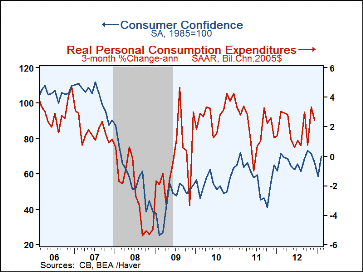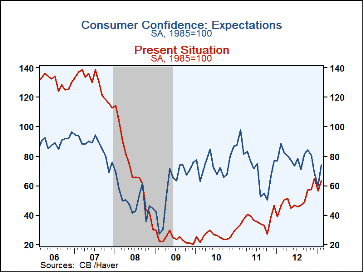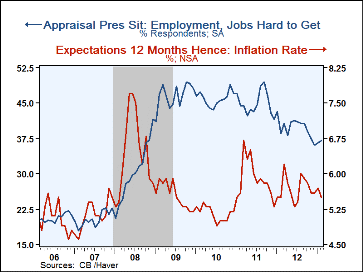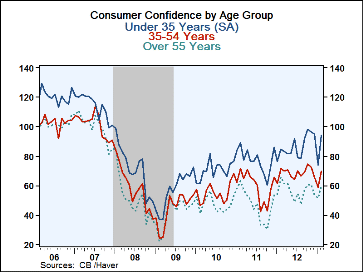 Global| Feb 26 2013
Global| Feb 26 2013U.S. Consumer Confidence Rebounds With Improved Expectations
by:Tom Moeller
|in:Economy in Brief
Summary
The Conference Board's Consumer Confidence Index for February rebounded to 69.6 and more than recovered the January decline. The gain outpaced Consensus forecasts for a rise to 60.5. During the last ten years, there has been a 47% [...]
The Conference Board's Consumer Confidence Index for February rebounded to 69.6 and more than recovered the January decline. The gain outpaced Consensus forecasts for a rise to 60.5. During the last ten years, there has been a 47% correlation between the level of confidence and the three-month change in real PCE.
The expectations component jumped 23.2% to 73.8 and reversed its January drop. An improved 18.9% of respondents thought business conditions would be better in six months. Also, a somewhat higher 16.7% thought there would be more jobs while an improved 15.7% expected higher income. Consumers' reading of the present situation also improved, but to a lesser extent m/m. The present situations index rose to 63.3 but didn't recover all of the January decline. Confidence in the labor market rebounded, but the 10.5% who thought that jobs were plentiful remained below the November high. A low 37.0% thought that jobs were hard to get. On the optimistic side, a higher 18.1% of respondents asserted that business conditions were good, the most in five years.
Expectations for inflation in the next twelve months fell to 5.5%, its lowest level since July of last year. The percentage of people looking for higher stock prices surged to 36.4% this month, while the percent who are bearish dropped sharply. The percentage of respondents planning to buy a home within six months collapsed to 0.3%, its lowest since the recession.
Consumer confidence varied greatly by age group. Those under 35 years old were the most confident, but that confidence is moderating. Middle aged individuals were more confident this month but less so than younger individuals. Those over 55 years remained the least confident about the economy.
| Conference Board (SA, 1985=100) | Feb | Jan | Dec | Y/Y % | 2012 | 2011 | 2010 |
|---|---|---|---|---|---|---|---|
| Consumer Confidence Index | 69.6 | 58.4 | 66.7 | -2.8 | 67.1 | 58.1 | 54.5 |
| Present Situation | 63.3 | 56.2 | 64.6 | 36.4 | 49.8 | 36.1 | 25.7 |
| Expectations | 73.8 | 59.9 | 68.1 | -16.5 | 78.6 | 72.8 | 73.7 |
| Consumer Confidence By Age Group | |||||||
| Under 35 Years | 93.7 | 74.0 | 94.8 | 10.6 | 86.5 | 77.3 | 70.4 |
| Aged 35-54 Years | 69.5 | 58.9 | 65.9 | -2.5 | 68.5 | 59.8 | 55.1 |
| Over 55 Years | 59.2 | 51.6 | 53.6 | -10.0 | 56.6 | 47.3 | 47.4 |
Tom Moeller
AuthorMore in Author Profile »Prior to joining Haver Analytics in 2000, Mr. Moeller worked as the Economist at Chancellor Capital Management from 1985 to 1999. There, he developed comprehensive economic forecasts and interpreted economic data for equity and fixed income portfolio managers. Also at Chancellor, Mr. Moeller worked as an equity analyst and was responsible for researching and rating companies in the economically sensitive automobile and housing industries for investment in Chancellor’s equity portfolio. Prior to joining Chancellor, Mr. Moeller was an Economist at Citibank from 1979 to 1984. He also analyzed pricing behavior in the metals industry for the Council on Wage and Price Stability in Washington, D.C. In 1999, Mr. Moeller received the award for most accurate forecast from the Forecasters' Club of New York. From 1990 to 1992 he was President of the New York Association for Business Economists. Mr. Moeller earned an M.B.A. in Finance from Fordham University, where he graduated in 1987. He holds a Bachelor of Arts in Economics from George Washington University.
More Economy in Brief
 Global| Feb 05 2026
Global| Feb 05 2026Charts of the Week: Balanced Policy, Resilient Data and AI Narratives
by:Andrew Cates










